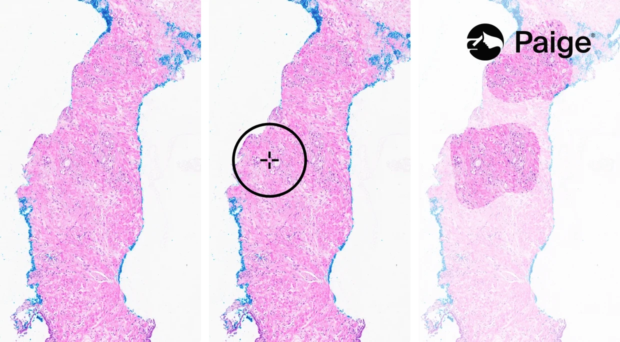[ad_1]

Figure of Paige Prostate outputs that are designed to help pathologists review prostate biopsy tissue. Left: digital image of a prostate core needle biopsy; Middle: Paige Prostate indicates a single focus of interest on the tissue that the algorithm has determined is most likely to harbor cancer; Right: Paige Prostate displays an overlay that outputs the areas of tissue that the algorithm has determined are suspicious for being cancerous.
The news about how artificial intelligence (AI) has progressed to closely mimic human thought and behavior has sparked diverse reactions. While some wonder how human intelligence and the economy may be affected, others ponder how we will handle the broad potential reach of AI.
One question of particular interest in the healthcare space is how AI might potentially help cancer patients receive a timely diagnosis, and importantly how the public would feel about AI being used this way. This is precisely the question we hope to answer as part of the ARTICULATE PRO study (Artificial Intelligence for Cellular Pathology Transformation in Prostate Practice).
ARTICULATE PRO is a multicenter study led by the University of Oxford that is evaluating the use of Paige Prostate*+, an AI-based software designed to help pathologists diagnose prostate cancer. Typically, men who may have prostate cancer undergo a biopsy and thin slices of the biopsied tissue are prepared in a histopathology laboratory so that pathologists can examine the tissue using a microscope to determine if the patient does in fact have cancer.
In recent years, however, digitization in pathology has made it possible for tissue samples to be scanned and turned into digital images, which has opened the door for AI to assist pathologists in the evaluation of the tissue. Paige Prostate is one such AI – it analyzes digital images of biopsy tissue and draws attention to areas of tissue that the AI has identified to be suspicious for harboring cancer to help pathologists make their diagnosis, including determining the severity and size of tumors. As part of the ARTICULATE PRO study, pathologists will utilize Paige Prostate during their routine diagnosis to assess its impact on their efficiency and confidence.

Margaret Horton, PhD, Professor Clare Verrill & Monica Dolton
Public and patient perspectives on AI
This brings us to the next study stage, which evaluates how patients and the broader public really feel about the use of AI like Paige Prostate in pathology and what their perceptions and concerns are surrounding AI.
We began in a small setting, with a focus group of prostate cancer patients and survivors and posed these questions to them. We were encouraged to hear them express strong vocal support for anything that helps to make the most precise and accurate diagnosis, including the use of AI.
We then sought to bring this topic to a broader group to even better gauge the perceptions of using a technology such as Paige Prostate in patient diagnostic pathways. ARTICULATE PRO administered a survey to supporters of Prostate Cancer UK (a leading UK-based prostate cancer charity), who themselves had undergone prostate biopsy, asking questions around their concerns and how they viewed AI’s potential benefits. The results of this survey demonstrated that the majority of patients are supportive of using AI in pathology, with only a small minority (<1%) not in favor of testing this technology.
Following the survey, ARTICULATE PRO engaged patient representatives to work as part of our study team. They provide further rich insights from their lived experience with prostate cancer, which we have applied to help the investigators define the shape and scope of the study to ensure it best serves physician and patient interests.

Human-led use of AI
One of the key findings from this survey was that when AI is used, it is key that it remains the pathologists – with their expertise and experience – who make the diagnosis of prostate cancer. This is straightforward for our study and system to address, as Paige Prostate is an adjunctive system, and pathologists who use the system always make the final interpretation. This finding has also led to a more profound consideration of human factors, such as how the pathologists interact with the AI platform and the considerations around how AI outputs can influence decision-making. Our study continues to investigate these topics through workshops and data gathering amongst other things.
On World Cancer Day, the study team honors prostate cancer patients and endeavors to bring them the best diagnostic experience that is possible by evaluating the potential of powerful AI technology in ARTICULATE PRO. Understanding the views of and engaging with patients is central to our efforts.
Disclaimers:
*In the European Union and the United Kingdom, Paige Prostate Detect and Paige Prostate Grade & Quantify are CE-IVD & UKCA marked for clinical use with Philips Ultrafast and Leica Aperio AT2 Scanners.
+ As of 1 March 2022, Paige Prostate was updated to Paige Prostate Suite, under which Paige Prostate Detect and Paige Prostate Grade and Quantify became two different products.
[ad_2]
Source link